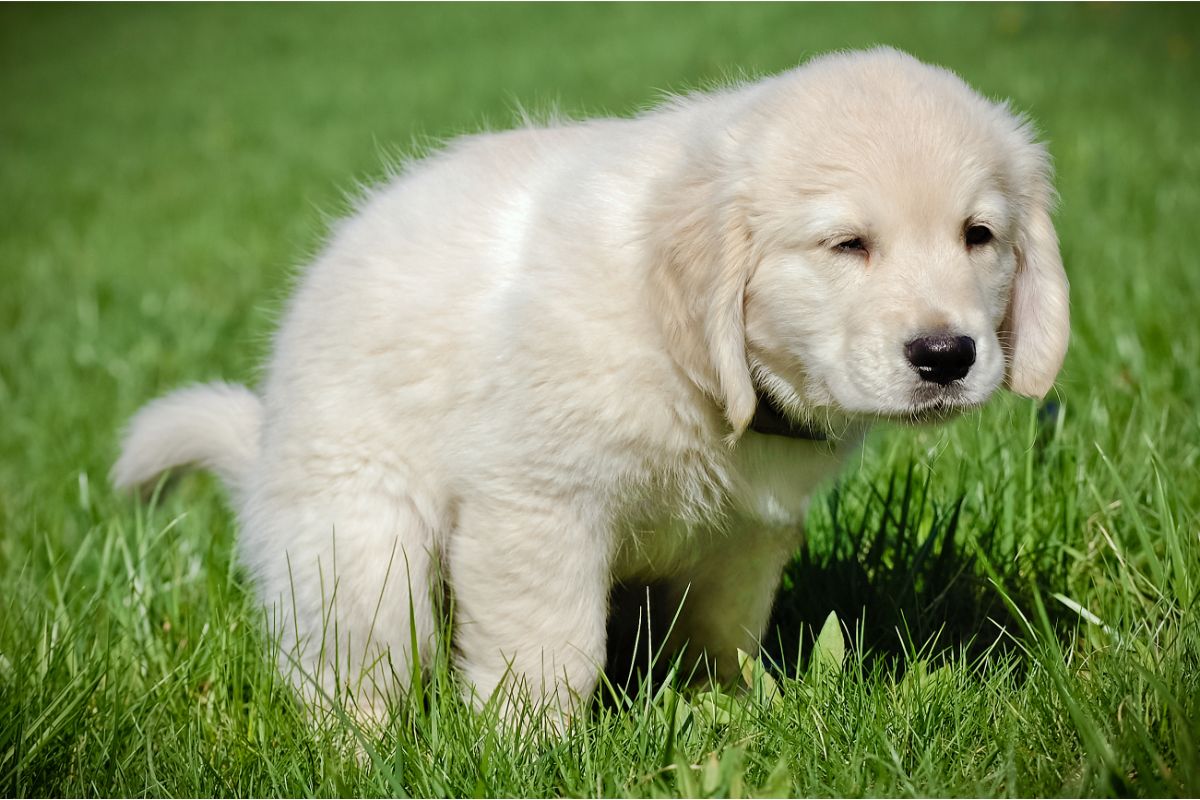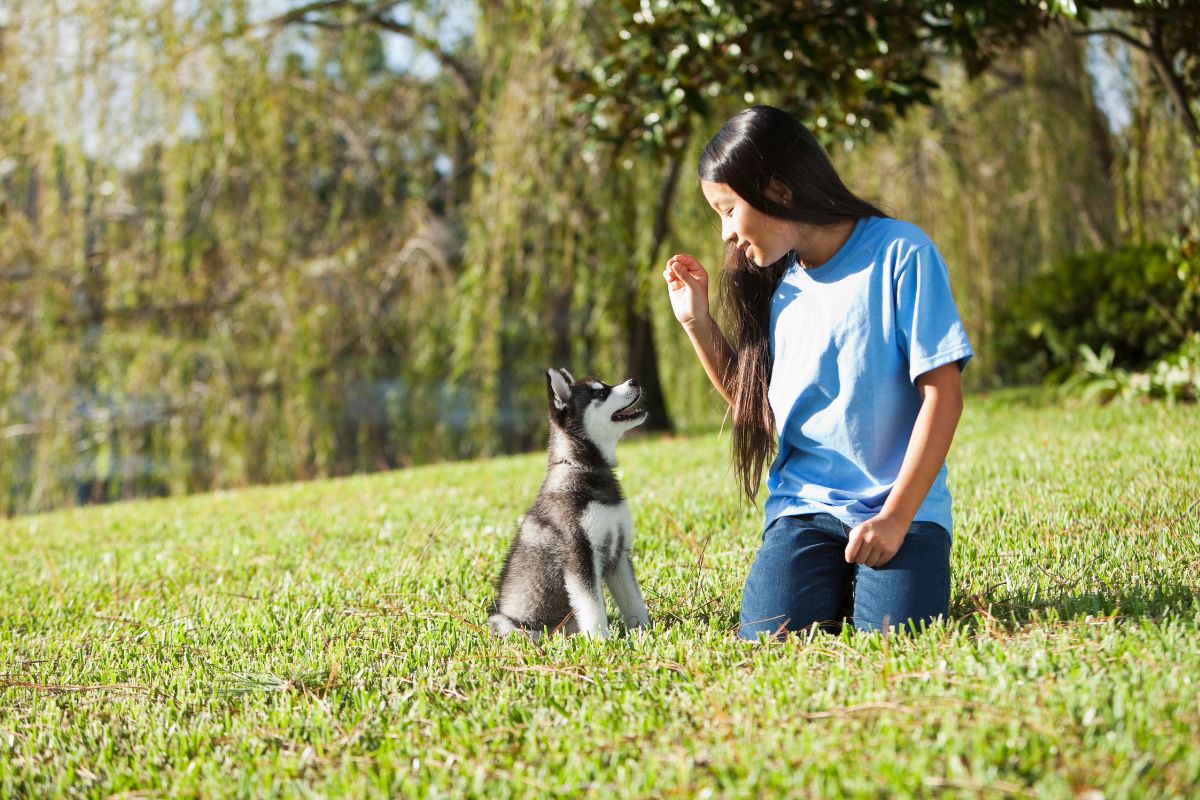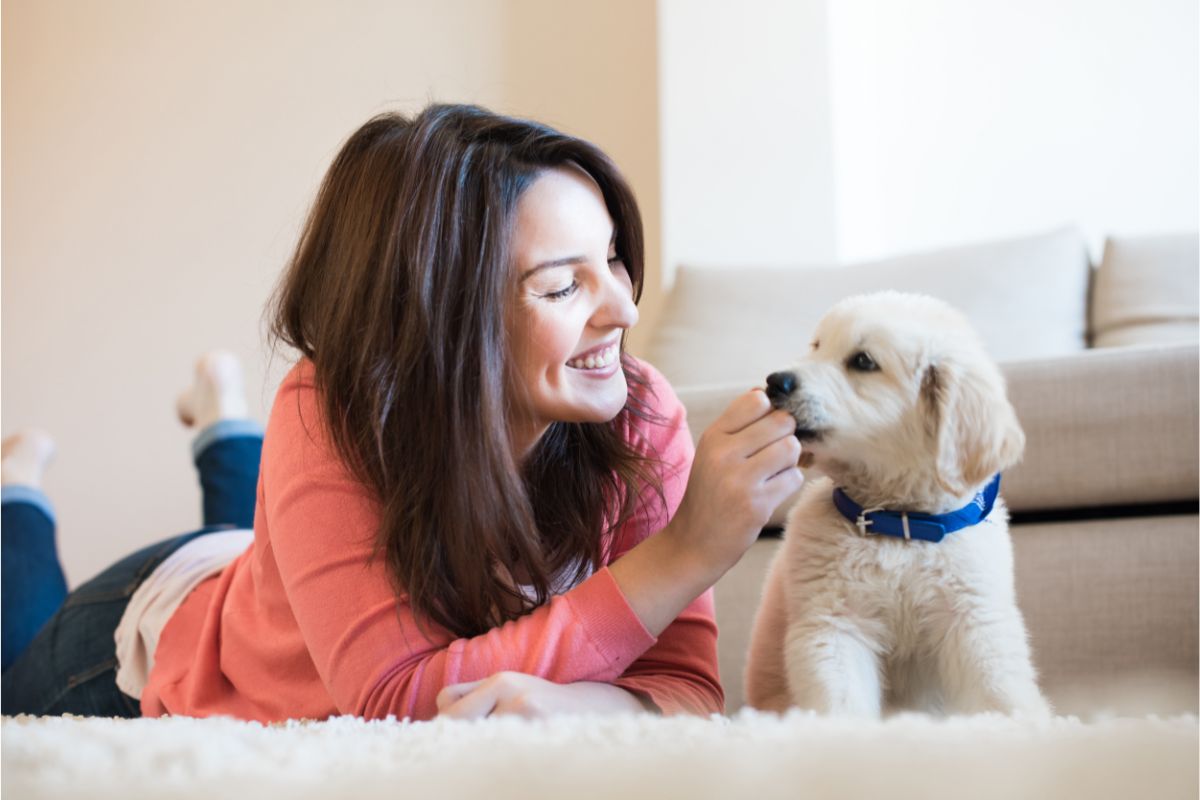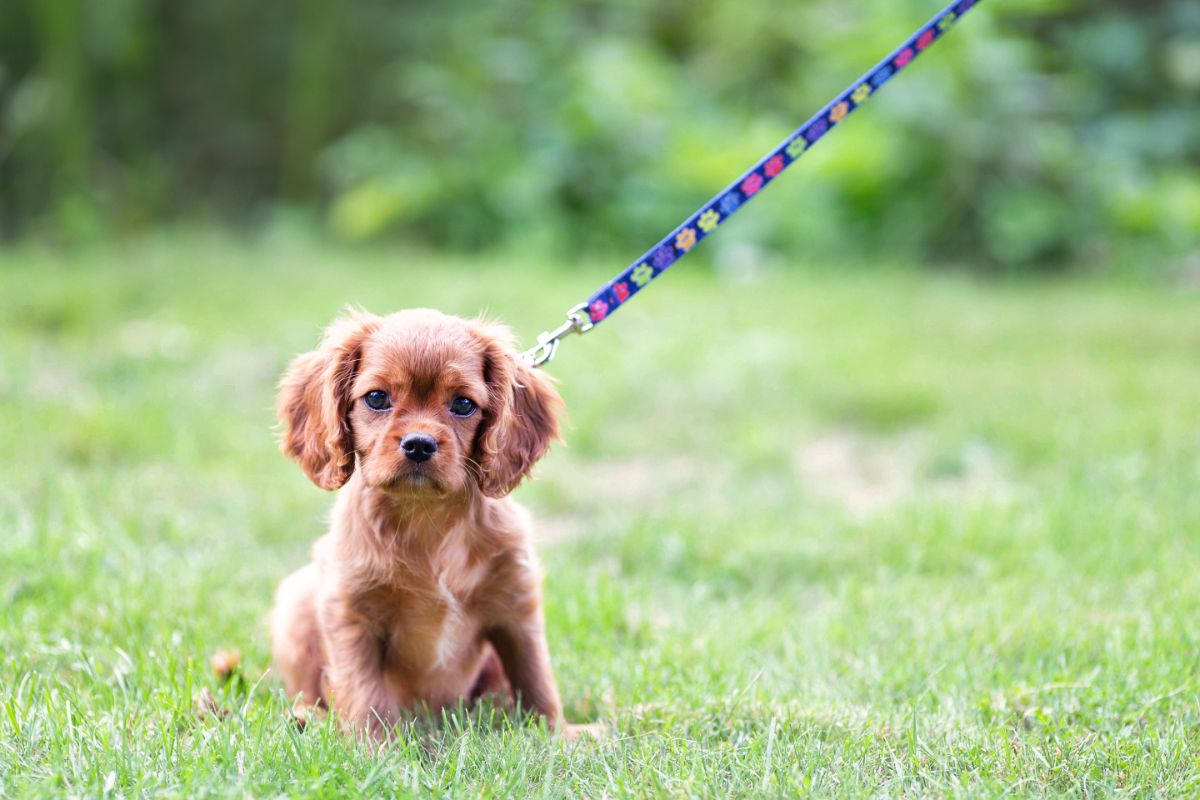Puppies are one of the cutest creatures on the planet. Yet, puppies can also be a handful. Not only will you have to train your adorable puppy, but you will also have to find strategies to stop it from barking.
Though it is perfectly normal for puppies to bark as a form of communication, this braking can become irritating if your puppy does it constantly (see also “Puppy Biting: See What Is Normal, What Isn’t Normal, And How You Can Curb It“). Puppies may bark for a whole host of reasons, such as because they have been triggered.

This guide will explore some of the reasons why your puppy is barking so that you can better identify the cause of the problem. It will also suggest different techniques that you can utilize to discourage your beloved puppy from barking constantly.
Why Do Puppies Bark?
As the primary form of communication for canines, puppies may bark for a large number of reasons. Some of the main reasons why puppies bark includes:
Protecting Territory
If a puppy detects a threat to its territory, the puppy may be encouraged to bark. The puppy will display aggressive behavior, such as biting and growling (see also “The 6 Types Of Growling“). This is merely a survival instinct for your puppy.
This is why a puppy will often bark when somebody knocks on your door. They will detect a potential intruder. By using training techniques, you can reduce the intensity with which your puppy barks when a person knocks on a door.
Anxiety
When your dog is anxious, it will display behaviors such as barking, shivering, or panting. These behaviors will be more common during traditionally stress-inducing situations, such as fireworks.
Anxiety can also come in the form of separation anxiety, which a puppy may experience when separated from its owner. As your dog becomes increasingly familiar with this separation, it should start to bark less.
Excitement
Dogs will outwardly show their excitement in numerous ways. For instance, it could jump up and down, run in circles, or smile with its tongue outstretched. Most importantly, an excited puppy may also bark.
Lack Of Stimulation
Puppies are excitable creatures with lots of energy. When bored, your puppies may begin to bark.
As a result, they require lots of stimulation. The main form of stimulation that a puppy will need is exercise.
If a puppy does not receive sufficient stimulation, it will become bored and irritated. Consequently, you will need to ensure that the puppy has plenty of exercises.
If the puppy is restless, this could be a sign that it requires more exercise.
Generally, a puppy will need at least one or two walking sessions per day (see also “How To Teach Your Puppy To Walk On Leash“). The length of the walk will depend on the age of the puppy (see also “Ways To Stop Your Puppy From Sniffing Everything On Walks“).
The puppy should have five minutes of exercise per month of age. Let’s say that you have a puppy that is four months old, it should have twenty minutes of exercise every day.
Other activities that you can use to keep your puppy stimulated include playing games, using fun food puzzles, and using interactive toys.
1. Identify The Cause Of The Barking
As the previous section proves, puppies may bark for a plethora of reasons. To get your puppy to stop barking, it’s recommended that you identify the reason why it is doing this.
This is because you will be able to find the perfect remedy.
For instance, if your dog is barking because it has not had enough stimulation, you can take your dog for a pleasant walk.
Meanwhile, if your puppy is barking because it has felt a threat to its territory, you can solve the issue by removing the perceived threat.
If your puppy is continuously barking at the same thing, this could be a clear indication that you need to make permanent changes to your routine.
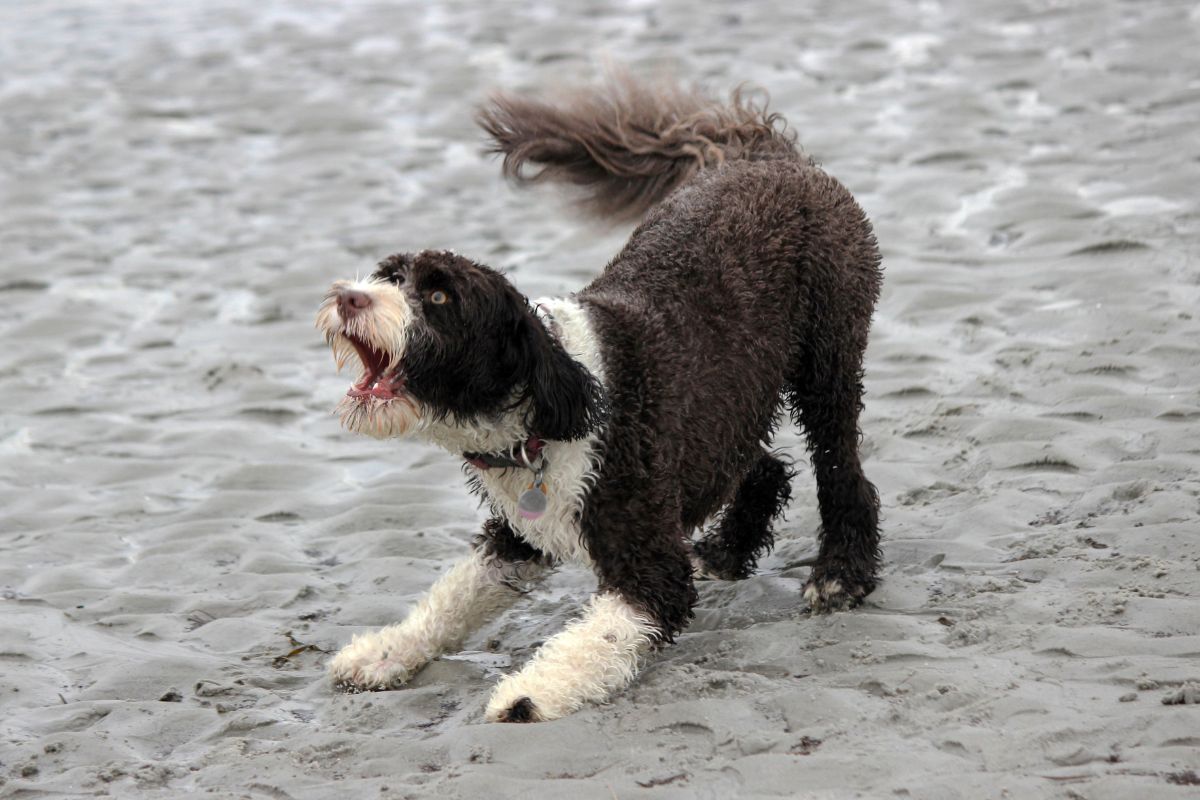
2. Use Sight Barriers
Often, puppies will bark at something that has caught their attention outside. They could see these distractions through windows or doors.
To prevent these distractions from being an issue inside your home, you can use sight barriers. This can include removable plastic window film or privacy fences.
Indoors, you can also close the blinds or curtains to stop your puppy from barking at anything it has seen outside.
When outside, a puppy could bark at a person or other dogs. During these situations, your puppy will be displaying territorial alarm barking.
It is perfectly normal for dogs to bark at one another. Just try to ignore this barking as much as possible. As your dog ages, it should become more used to seeing other dogs and people outdoors.
Alternatively, you can use a muzzle to discourage barking and biting. When used correctly, these muzzles will not cause discomfort to your beloved canine. Just bear in mind that muzzles are controversial among dog lovers.
It will be difficult to employ sight barriers outdoors. On the other hand, you can try to stop your puppy from seeing other animals by attempting to obscure its vision.
3. Establish A Safe Space
It’s a great idea to add a safe space to your home when you adopt a puppy. To do this, all you have to do is set aside a comfortable space in which your dog can feel safe and secure.
Creating a safe space is especially valuable if your dog suffers from separation anxiety. This occurs when a dog feels distressed about being separated from its owner, such as when a puppy is left at home.
When triggered, your puppy will display unwanted behaviors like barking or whining.
Whenever your puppy is barking, you can encourage it to go to the designated safe space. Thanks to the calming effect of this space, your puppy is far less likely to bark.
Making a safe space can be easy. Simply try to make this area as snug and cozy as possible. Add lots of pillows and blankets so that your puppy can relax here. Try to find a quiet part of your house.
Ideally, a safe space should have a small number of windows to reduce the number of distractions. Alternatively, you can simply cover these windows to minimize external distractions.
You don’t have to sacrifice an entire room to establish a safe space for your puppy. Instead, you can create a comfortable environment within a dog crate.
4. Do Not Reward Barking
When your dog behaves properly, it is advised that you reward them in some way. This can be through treats or toys. Alternatively, you can verbally celebrate a puppy’s good behavior or give it an encouraging pat on the back.
This is because a puppy is likely to repeat these good behaviors when it receives a reward. As a result, you will encourage your pet to behave properly into adulthood.
Yet, pet owners mustn’t reward bad behavior. This is because these rewards will have the same effect. Your puppy will continue to behave badly in the hopes that it will be rewarded.
Therefore, you should not reward your puppy after it has been barking. You should also try not to give it too much attention, as your dog may interpret this as encouragement.
When your puppy starts to bark, you should verbally discourage it with a rigid “No”. Alternatively, you can try to simply ignore the puppy.
Though this can be quite irritating, your dog may simply be barking to grab your attention. By withholding this attention, your dog will likely become bored and will stop barking.
Once your puppy has stopped barking, you can reward its silence by giving the dog its favorite food.
Ensure that you do not give too many unhealthy treats, as this can lead to your puppy becoming obese. When rewarded for being quiet, your dog will link this behavior with a positive reward.
5. Ensure That Your Puppy Gets Enough Exercise
As mentioned, one of the main reasons why puppies will bark is because they are not receiving sufficient stimulation. If a puppy is barking randomly, a lack of stimulation is usually the cause.
Your puppy will begin to act out because it is bored and has too much energy with no way of using it up.
Thankfully, there is a simple solution to this problem. You can calm your puppy down by taking it for a walk. You don’t have to go far; puppies will not require long walks.
When you return from your walk, your puppy will have used up a lot of its energy so it should stop barking.
There are other ways that you can ensure that a puppy receives enough exercise. This is particularly recommended if you are nervous about taking your dog into public spaces.
For instance, you can play fetch in your garden or encourage your puppy to play with some of its toys.
Chew toys are a wonderful way of keeping a puppy entertained. Not to mention, these terrific toys can be a great way of making sure that a puppy doesn’t chew on things that it is not supposed to, such as your furniture.
Just make sure that you supervise your puppy’s playtime. This is because they may accidentally break the chew toy and ingest something potentially harmful.
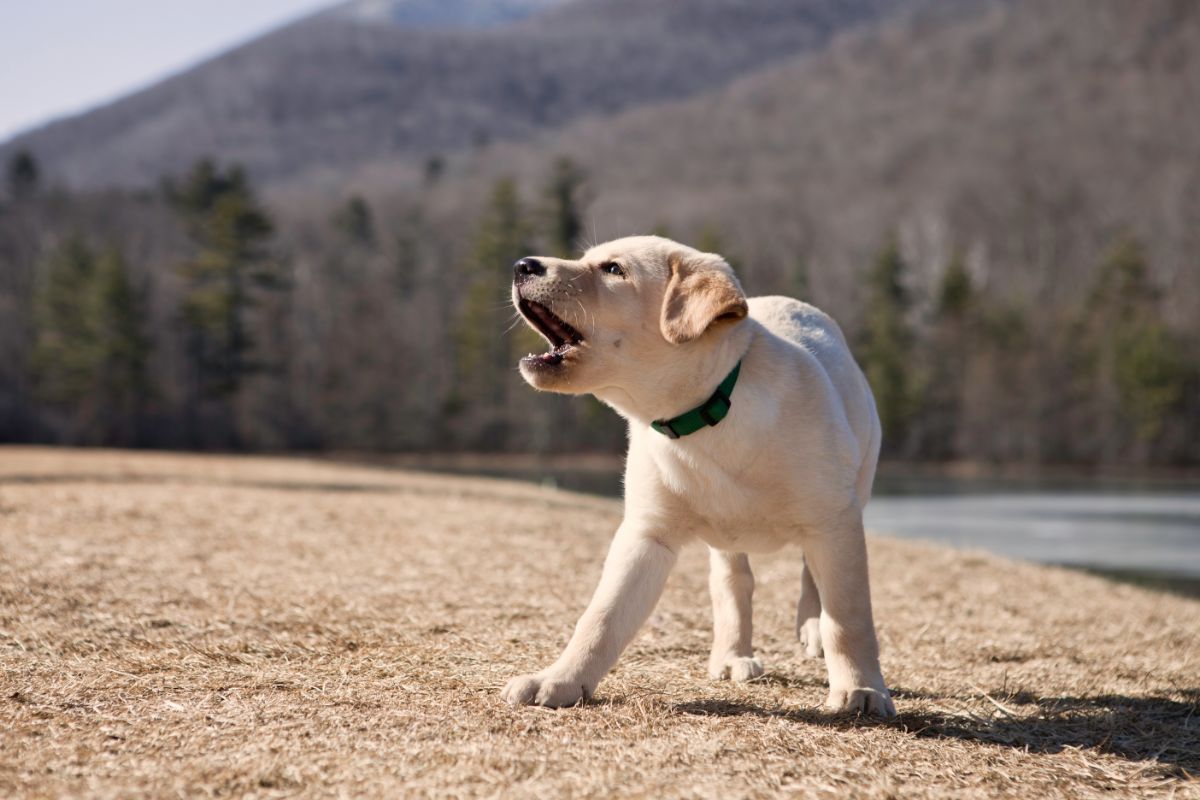
6. Do Not Punish Your Puppy
When your puppy has been barking regularly, it’s natural to get a little frustrated. However, you should refrain from shouting at your puppy or punishing them in another way.
If you shout at your puppy and tell it off, your pet may become even more anxious or irritated. This can increase the energy level of your puppy, thus making it bark even more.
As a result, it is better to use a soft voice when communicating with your puppy.
Negative reinforcement has not been proven effective. This is the process of removing a pleasant object to encourage desired behavior.
Instead, positive reinforcement is a much more effective method for training puppies. This can be done by introducing a positive stimulus to get your puppy to act a certain way.
For instance, you can give your puppy a toy whenever it behaves well.
7. Use Training Techniques
Training is a crucial part of raising a puppy. This training will allow you to encourage a dog to behave in a certain way.
Pet owners can use training to encourage puppies to communicate in different ways. This is a great technique for when a dog is barking at something specific.
One such technique involves driving the attention of your puppy to the floor. When a dog spots something on the ground, its natural instinct is to sniff it.
Interestingly, a dog is incapable of sniffing and barking at the same time. This unique quirk can be manipulated by dropping a treat to the floor so that your dog sniffs it instead of barking.
Moreover, you can use obedience commands to change your dog’s behavior. Whenever your puppy starts to bark, you can use one of the following commands to distract it:
- Sit
- Stay
- Come
- Down
8. Address Recurring Issues
Your dog may show recurring patterns of behavior. For example, a puppy might bra whenever a mail person gives you letters. In this instance, it is recommended that you tackle the problem.
Otherwise, your puppy will continue to bark in the presence of a mail worker.
If you feel comfortable, you can ask a mail person to help you calm the dog down. For example, you can ask the mail worker to feed your puppy some treats so that it does not feel threatened.
Then, you can continue to give your puppy a treat whenever it fails to bark at a postal worker.
Frequently Asked Questions
Is It Normal For Puppies To Bark?
Yes, barking is standard behavior for puppies. No matter what age your dog is, it is unlikely to stop barking. However, you can use these steps to limit the amount of barking that your puppy is doing.
When Are Puppies Most Energetic?
Generally, puppies are most energetic when they are around 12 months old. These puppies will usually mature once they reach approximately 18 months of age.
Can Dogs Be Trained Not To Bark?
Training can be used to encourage your dog to stop barking (see also “What Is Positive Dog Training?“). On the other hand, training is unlikely to make your dog stop barking entirely. This is because it is perfectly normal for a dog to bark.
Final Thoughts
Introducing a puppy to your home can be a great feeling. These phenomenal pets will bring lots of energy and excitement to your home. Unfortunately, these energetic creatures can also be a handful, as puppies are prone to barking.
This barking can be difficult to deal with. Luckily, you can discourage your puppy from barking by using the aforementioned methods.
- How To Teach Your Puppy Their Name Easily! - July 18, 2023
- Is Your Puppy Counter Surfing? Find Out How To Stop It! - July 18, 2023
- How To Train Your Puppy For Car Rides: Everything You Need To Know - July 18, 2023

